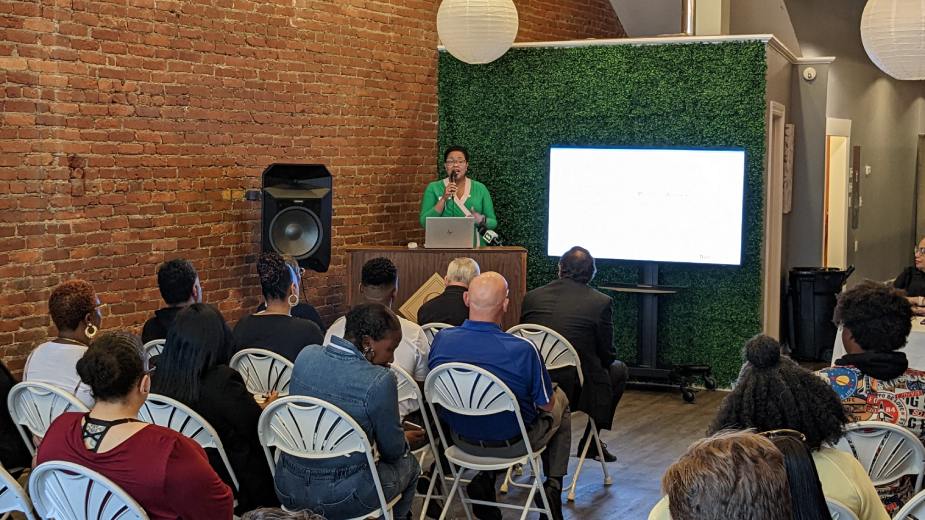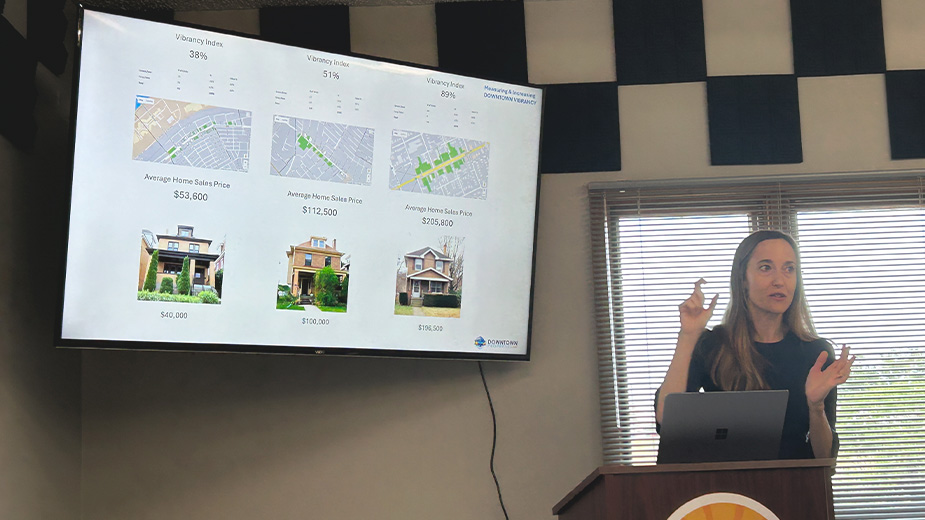State Development Leaders Outline Opportunities for Women, Minority-Owned Businesses
YOUNGSTOWN, Ohio – The state of Ohio will be rolling out new financial tools to assist minority-owned and women-owned businesses in the coming months, state officials said Wednesday.
Officials including Lydia Mihalik, director of the Ohio Department of Development, and representatives of the department’s Minority Business Development Division and the state Minority Business Assistance Center housed at the Youngstown Business Incubator outlined existing and upcoming assistance programs during a regional listening tour session.
About 60 people attended the event, which was held at Concept Studios downtown.
“We have a lot of new capital options to be able to help these businesses either grow or expand or start, and we want to make sure that these offerings are known about,” Mihalik said.
ODOD, through the minority business development division, recently introduced two new initiatives to help state-certified minority-owned and women-owned businesses.
The Ohio Micro-Loan Program offers loans from $10,000 to $45,000 at zero percent interest that can be used by state certified minority business enterprises and women-owned business enterprises – known as MBEs and WBEs, respectively — for refinancing debt, working capital and fixed assets, said Monica Womack, chief of the state’s minority business development division.
Woman-owned businesses are eligible to take loans out for $45,000 to up to $500,000 at 1.5% for state-certified WBEs or 3% for uncertified businesses, she continued.
Other options available to disadvantaged entrepreneurs though the division include the Minority Direct Loan Program, and Women Business Bonding Program.
“If you want to grow, you need other people’s money,” said Shaundretta Boykins, business development and entrepreneurship manger in the minority business division. “That is the key to wealth creation that you can pass down.”
The state also was awarded $182 million in federal funds to assist minority-owned, women-owned and veteran-owned businesses that will be made available through the new Small Business Credit Initiative, which will launch in 90 to 120 days, Boykins said.
One of the changes ODOD made that has had a major impact was merging the state’s equal opportunity division with the minority business division, creating a “one-stop shop for minority and underserved businesses” to receive the state certifications, which make them eligible for capital programs and business counseling, Mihalik said.
The Youngstown MBAC office helped 31 businesses with WBE certifications, 32 with MBEs, 41 as Encouraging Diversity, Growth and Equity — or EDGE – Program businesses, and 12 as veteran-friendly business enterprises, Mihalik said.
“We’ve been able to reduce the number of required documents in the certification process from 26 to 13, and that’s huge when we’re thinking of how businesses are trying to still work their business as well as become certified,” Womack said.
The state is working on streamlining its process so all of the certifications can be done on Ohio’s Business Gateway by the end of the year.
“That way you’ll be able to not only apply for one or all of the certifications at one time, but you’ll also be able to upload your documents into a secure system so that you’re not going to have to worry about piecemealing or having to make multiple email transactions,” Womack said.
Additionally, Mihalik noted that Senate Bill 105, which Gov. Mike DeWine signed into law not long ago, simplified the certification process for minority-owned, women-owned and veteran-owned businesses to make the process more business friendly.
All of that is important because Ohio secured “the biggest economic development project in Ohio’s history,” Intel’s $20 billion semiconductor manufacturing complex, which will have “ripple effects” throughout the state, she said.
“We are encouraging Intel to honor the commitments that it has made regarding jobs and the company has promised that diversity and inclusion will be a priority, not only in its hiring practices, but also in its selection of vendors and suppliers,” she said. “And we’ve already assisted the company in those efforts by providing lists of Ohio certified minority-owned, women-owned and veteran-owned businesses.”
YBI and Youngstown officials also are working with Amazon to provide certified business owners with a platform to sell their products “not just locally, but nationally and globally,” Stephanie Gilchrist, director of the Youngstown MBAC, said.
“We would love to see this executed by January 1, 2023,” she said.
Kimberly Johnson, owner of Aisle One Mobile market in Youngstown, which catered the event, said she qualifies for all three certification programs mentioned and she is in the process of completing the process. She also said she wants to use one of the loan programs to refinance an existing loan and “help me be successful to moving toward making a profit.’
Also among those attending was Keland Logan, owner of Emerald City Construction Co. LLC, Youngstown. Earlier this year, YBI assisted Emerald City with getting MBE certification for his company. He already is listed with Intel as a construction provider in the state and the project represents “a lot of promise” for companies like his.
He also praised Mihalik and her colleagues for “being proactive as far as breaking down barriers and creating opportunities for businesses like ours,” and anticipates some of the financing programs discussed at the event could help his company.
As a general contractor, Emerald City has to “foot the bill” for its projects, and barriers to capital are “unfortunately inherent in our community,” he said.
“It just means that we’ll have the opportunity to do more larger projects, put more people to work and not lose our footing as we do those things,” he said.
Copyright 2024 The Business Journal, Youngstown, Ohio.



